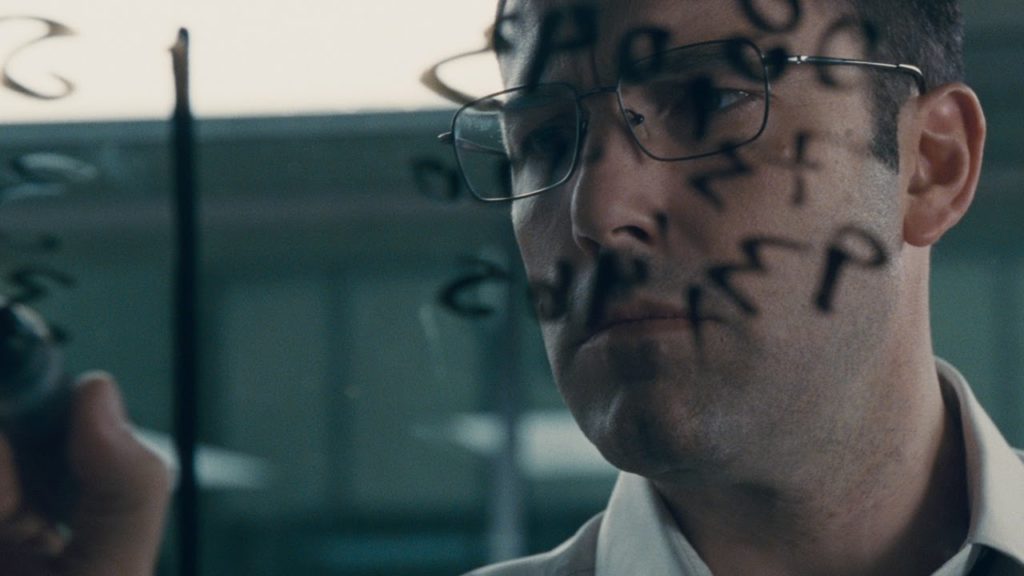The Accountant (2016)
CAST: Ben Affleck, Anna Kendrick, J.K. Simmons, Jon Bernthal, Cynthia Addai-Robinson, John Lithgow, Jeffrey Tambor, Jean Smart
REVIEW:
The Accountant is a curiously inert thriller mixed with a character study, or perhaps, as some have called it, a character study masquerading as a thriller. A perfunctory attempt at portraying the symptoms of a character with high-functioning autism/Asperger’s (the movie is slightly vague about his specific diagnosis) gives way to a generic shoot-em-up. An unneccessarily convoluted narrative structure—featuring flashbacks to several different time periods in the main character’s life, myriad superfluous subplots and extraneous supporting characters—serves only to muddy the waters and disguise the fact that, when all is said and done, there wasn’t that much to it. For a movie centering on a man of simplistic single-minded purpose, The Accountant seems desperate to convince us it’s more complex than it actually is.
Christian Wolff (Ben Affleck) is a high-functioning autistic and savant whose ineptitude in social situations is only matched by his brilliance with math (along with martial arts and sharpshooting skills drilled into him by his domineering military father, played in flashbacks by Robert C. Treveiler). Christian has used his gifts to amass ill-gotten gains by cooking the books for drug cartels and mobsters the world over, while maintaining an inconspicuous life working as an accountant in a small office in a strip mall and living in an intentionally generic house in a generic suburban neighborhood (though there’s also the storage trailer, filled with heavy weaponry, multiple passports with different identities, etc. he keeps for a rainy day). But Christian’s shady double life is catching up with him. Treasury Department investigator Raymond King (J.K. Simmons) has tasked young up-and-coming agent Marybeth Medina (Cynthia Addai-Robinson) with tracking down the mysterious “Accountant”, using her own checkered past as blackmail material to ensure she gets the job done ASAP. Aware that the Treasury is on his trail, Christian tries to cover his tracks by taking on a major legitimate client, auditing state-of-the-art robotics company Living Robotics for its CEO (John Lithgow) and his co-founder and sister (Jean Smart). But things don’t go smoothly here either. Young lowly accountant Dana (Anna Kendrick) has stumbled across $61 million missing from Living Robotics, which makes her the target of a hit squad led by “security specialist” Braxton (Jon Bernthal). Christian is forced to go on the run protecting Dana from Braxton’s goons while evading the various factions pursuing him and find out who stole the missing funds.
“Do you like puzzles?” two different characters ask at various points, but for a would-be tagline, this comes across like the movie giving itself an unearned pat on the back. The Accountant gives a shallow illusion of sophistication and complexity with flashbacks to both Christian’s early childhood with his tough love father and his prison time sharing a cell with a mob bookkeeper-turned-informant (Jeffrey Tambor), who teaches him the tricks of the trade, along with a poorly-integrated subplot (J.K. Simmons and Cynthia Addai-Stevenson’s Treasury agents have no effect on the main plot, never even share a scene with Ben Affleck, and one ultimately realizes their entire subplot could have been left out of the movie without really changing anything except a shorter runtime). Two characters are too obviously red herrings, and when the villain is revealed, it’s hardly a surprise. Another climactic “surprise twist” is easy to see coming from early on.
 The biggest thing lending The Accountant
The biggest thing lending The Accountant a sliver of distinction is the main character’s autism. When it comes to its portrayal of Christian’s symptoms, the movie makes a reasonable effort to be accurate and respectful. In the flashbacks to his early childhood (where he is played by Seth Lee), he is prone to uncontrollable fits of rage and frustration, unable to cope with hugs or any other close physical contact, hypersensitive to fabrics on his skin, uncommunicative, and intensely obsessive compulsive (he meticulously pieces together a puzzle upside down without seeing the picture, but throws a tantrum when he can’t find the last missing piece). As an adult, he is a quiet, withdrawn loner, a meticulous math whiz (he solves Living Robotics’ financial discrepancy by spending one night poring over fifteen years of financial records which end up covering the walls and windows of his office) but uncomfortable with social interaction, irritable over any slight changes to his carefully structured daily routine, and inept at making small talk (used to low-key comedic effect when he and Dana make a painfully awkward attempt at chit chat). His interactions with Dana seem to bring a possibility of romance, but it never gets further than a little stilted sexual tension. It’s obvious that Christian forms some level of feelings for her, but not that he is capable of expressing.
While the plot and the main character’s mental issues are very different, I was vaguely reminded of The Lookout, a low-key little indie movie from 2007, starring Joseph Gordon-Levitt as a man with short term memory loss who gets roped into participating in a bank heist. Like The Lookout, The Accountant gives itself a smidgen of distinction by devoting some significant screentime and character development to a character study of a man with a specific mental issue, but also like The Lookout, this ultimately gives way to a generic and humdrum thriller. The Accountant is heavier on action than The Lookout, but its action is unmemorable, consisting of a couple generic shootouts and an underwhelming climax with our methodical anti-hero storming the big bad’s mansion populated with cannon fodder goons. Our bad guys are our usual crack team of vaguely-identified special forces mercs, but they don’t convince us of their competence, which means Christian also doesn’t impress us as much as he’s meant to by dispatching a houseful of dime a dozen rent-a-thugs. Jason Bourne’s status as action superstar is not threatened by Christian Wolff.
 Ben Affleck does an adequate job ticking off a checklist of autism symptoms—he avoids direct eye contact, acts uptight and aloof, speaks in a stilted, robotic way, and twitches his otherwise blank face when irritated—but it ends up feeling like surface. Perhaps a more accomplished actor than Affleck could have conveyed deeper currents churning beneath the closed-off exterior, but Christian remains a bit of a blank slate, a half-baked amalgamation of Rain Man, Will Hunting, and Jason Bourne but less developed and less sympathetic than any of them (between Hunting and Bourne, Affleck’s BFF Matt Damon has been more convincing as both a math genius and an action hero). Anna Kendrick is her usual perky self, but gets nothing to do besides be the damsel in distress and Christian’s would-be love interest. Jon Bernthal recently opened a ferocious can of whoop-ass as The Punisher on the second season of the Netflix superhero series Daredevil, but is sadly watered-down here. Braxton doesn’t convince us of his ostensible badassery. John Lithgow and Jean Smart have thankless walk-on roles, and Jeffrey Tambor has basically a glorified cameo. Unsurprisingly, the best performance is from J.K. Simmons, who does a nice job playing his world-weary retiring detective (shades of Commissioner Gordon, whom Simmons will soon play alongside Affleck’s Batman in the upcoming Justice League movie?), even if his character ultimately has no bearing on anything else in the movie.
Ben Affleck does an adequate job ticking off a checklist of autism symptoms—he avoids direct eye contact, acts uptight and aloof, speaks in a stilted, robotic way, and twitches his otherwise blank face when irritated—but it ends up feeling like surface. Perhaps a more accomplished actor than Affleck could have conveyed deeper currents churning beneath the closed-off exterior, but Christian remains a bit of a blank slate, a half-baked amalgamation of Rain Man, Will Hunting, and Jason Bourne but less developed and less sympathetic than any of them (between Hunting and Bourne, Affleck’s BFF Matt Damon has been more convincing as both a math genius and an action hero). Anna Kendrick is her usual perky self, but gets nothing to do besides be the damsel in distress and Christian’s would-be love interest. Jon Bernthal recently opened a ferocious can of whoop-ass as The Punisher on the second season of the Netflix superhero series Daredevil, but is sadly watered-down here. Braxton doesn’t convince us of his ostensible badassery. John Lithgow and Jean Smart have thankless walk-on roles, and Jeffrey Tambor has basically a glorified cameo. Unsurprisingly, the best performance is from J.K. Simmons, who does a nice job playing his world-weary retiring detective (shades of Commissioner Gordon, whom Simmons will soon play alongside Affleck’s Batman in the upcoming Justice League movie?), even if his character ultimately has no bearing on anything else in the movie.
Director Gavin O’Connor brings a gritty, unglamorous, down-to-earth filming style that recalls the docudrama feel of his 2011 sports drama Warrior—as different as the two movies’ plots are, some slight similarities emerge in the themes of a troubled dysfunctional family—but Bill Dubuque’s script shuffles poorly integrated plotlines together like mismatched puzzle pieces that never add up to anything much. The Accountant is moderately engaging in a generic sort of way, but while it juggles a lot of numbers, it ultimately arrives at a zero sum.
* * 1/2
